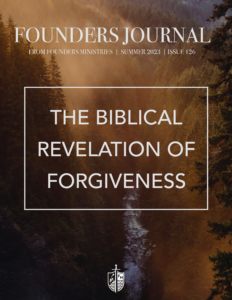God reigns over all—even the smallest things. “Random” and “chance” may invade our vocabulary as we interpret the universe from our dim and limited perspective, but they misrepresent a world created and sustained by God. Sparrows, the hairs of our head, and every atom have their place and purpose in God’s providence. And more, “all things work together for good to them that love God” (Rom. 8:28 KJV). Yet, while Scripture clearly teaches these marvelous truths, we struggle to apply them to our daily lives. When was the last time you bumped your head and immediately thanked God for the spiritual lesson to be gained by the pain? And what about the application of God’s providence to His command that we forgive those who abuse and spitefully use us? Along with “love your enemies,” forgiving those who hurt us ranks among the more difficult duties of God’s children.
Scripture speaks a great deal of forgiveness and provides many examples. Indeed, Christ’s death purchased God’s forgiveness of our sins, even as He asked the Father to forgive His tormentors in the midst of His agony on the cross, “for they know not what they do” (Luke 23:34 KJV). And imagine how our spiritual growth would suffer without God training us with trials and adversity, or if God granted our every wish for a carefree life? Yet, we are often slow or unwilling to view our injuries, and for the present purpose—those who bring them—as God’s gifts for our good and the good of others. We can fail to see that God’s providence calls for forgiveness.
Consider the life of Joseph. From a worldly viewpoint, He could easily justify unforgiveness and revenge. His jealous brothers hated him as their father’s favorite, they hated him for his honest report concerning their work (or lack thereof), they hated him for his dreams, and they threw him in a pit and sold him as a slave. Further, when he held fast to God in the face of the temptation by Potifer’s wife, he landed in prison—and that for many years. And if that wasn’t enough, the tall tale that he was torn to pieces by a wild beast nearly killed his father with sorrow, a pain and deception his brothers let stand for years.
Nonetheless, it ended well. Having earned his degree in the seminary of hard knocks, God appointed Joseph to Pharaoh’s right hand in order to save lives, including God’s chosen people. But did Joseph discern God’s plan as he languished in the pit or woke up each day in prison? Not likely. Yet after a few more dreams and the feeding of a nation during the seven-year famine—like Job’s epiphany at the end of his suffering—Joseph understood.[1] His worldly brothers, however, braced for the worst when they saw his position and power, and, apart from God’s grace, they likely would have received it. But to their surprise (and for our instruction), the beauty of God’s design in their younger brother’s words calmed their hearts: “Do not fear, for am I in the place of God? As for you, you meant evil against me, but God meant it for good, to bring it about that many people should be kept alive, as they are today” (Gen. 50:19-20 ESV). God’s providence fashioned Joseph’s forgiveness.
Above all, we love because He first loved us, and we forgive because He first forgave us. As God has forgiven our infinite debt of sin against Him through Christ’s saving work, so we should forgive others their relatively minor sins against us. At the same time, we live in God’s world, created, sustained, and orchestrated for His glory and our good. Edwards writes,
That the hand of God is a great deal more concerned in all that happens to us than the treatment of men is, should lead us, in a great measure, not to think of things as from men, but to have respect to them chiefly as from God—as ordered by his love and wisdom, even when their immediate source may be the malice or heedlessness of a fellow-man.[2]
What others intend for our hurt, God uses for our good. Thus, when we rightly view God’s providence in every facet of our lives and respond accordingly, we will forgive.
[1] See Job 42:1-5.
[2] Jonathan Edwards, Charity and Its Fruits (Edinburgh: The Banner of Truth Trust, 2000), 80.





























